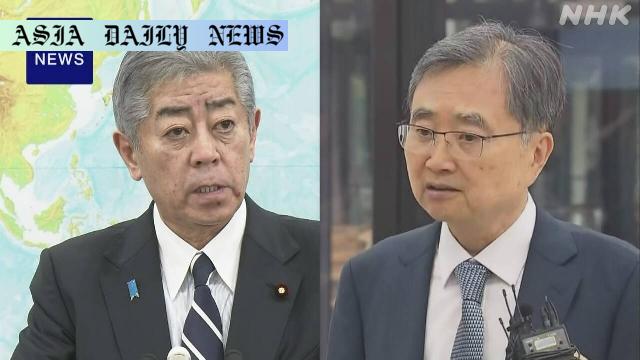South Korea-Japan Relations: South Korean Foreign Minister Cho Hyun will meet Japanese counterpart Iwaya Takeshi to deepen bilateral ties.
South Korean Foreign Minister Cho Hyun’s first official Japan visit aims to enhance bilateral ties.
Discussion topics include North Korea’s missile developments and trilateral cooperation with the US.
Cho will hold face-to-face talks with Japanese Foreign Minister Iwaya Takeshi, strengthening diplomatic relations.
Cho’s visit aims at creating a future-oriented and mutually beneficial partnership between South Korea and Japan.

Introduction: Importance of Diplomatic Visits
Diplomatic visits often serve as a beacon of goodwill and contribute toward fostering strong relations between nations. In the case of South Korea and Japan, two geographically close yet historically strained neighbors, such visits have immense significance. Recently, South Korean Foreign Minister Cho Hyun announced that he will make his inaugural visit to Japan to meet his Japanese counterpart, Iwaya Takeshi. This marks a pivotal moment in South Korea-Japan relations, paving the way for stronger bilateral cooperation.
A Focus on Bilateral Relations
The visit comes amidst a backdrop of regional tensions and varying narratives in both countries’ histories. This meeting between Cho and Iwaya reflects a concerted effort by both sides to move beyond past grievances. Cho expressed his commitment to building a future-focused partnership and working collaboratively with Japan on pressing regional issues, including trade concerns, environmental challenges, and security threats.
Regional Security and North Korea
One of the primary topics slated for discussion is North Korea’s nuclear and missile development. As neighbors that share a vested interest in regional security, South Korea and Japan’s cooperation remains crucial. This dialogue underscores the importance of aligning efforts with the United States in pursuing denuclearization and maintaining peace.
Trilateral Cooperation with the United States
Another critical aspect of this visit is the emphasis on trilateral cooperation involving the United States. In maintaining collective security and addressing global challenges, partnerships that transcend bilateralism are essential. This meeting between South Korea and Japan serves as a stepping stone towards creating a united front for addressing strategic regional concerns, technological advancements, and economic collaboration.
Future-Oriented Collaboration
Cho’s visit carries a message of hope and optimism for the future. Despite lingering historical disputes, this symbolizes the intent of both nations to collaborate on shared interests and challenges. If successful, this could mark the beginning of a more harmonious Japan-South Korea relationship, mutually benefitting both nations and the broader region.
Conclusion
As Cho Hyun departs for Japan and subsequently heads to the United States, this diplomatic journey underscores South Korea’s active and vested role in global diplomacy. It is these small yet significant steps that shape international relations, eventually fostering peace and cooperation among nations. Observers will closely follow the outcomes of these discussions and their ripple effects on regional and global scenarios.
Commentary
Strengthening Regional Ties: A Diplomatic Imperative
South Korean Foreign Minister Cho Hyun’s maiden visit to Japan represents a crucial step forward for the region. In a world where diplomacy is increasingly being tested by national interests and historical grievances, efforts such as these affirm the importance of dialogue and mutual understanding. South Korea and Japan have much to gain by shifting their focus toward collaboration rather than contention. This visit symbolizes a hopeful moment for the region’s future stability and growth.
Shared Security Concerns Over North Korea
The focus on coordinating efforts surrounding North Korea’s nuclear ambitions highlights the ever-present spectre of regional insecurity. For years, North Korea’s military developments have been a cause for concern for its neighbors, necessitating unified action. By working with Japan and the United States, South Korea is signaling its commitment to prioritizing shared security over isolated national interests. This could lead to more synchronized regional strategies that address not only military concerns but also human rights and economic issues pertaining to the Korean Peninsula.
A Moment for Reconciliation
While there is optimism around this visit, it’s impossible to ignore the historical and economic challenges between South Korea and Japan. However, diplomacy provides a platform to rebuild trust and nurture long-term partnerships. By focusing on the future rather than the past, this trip, at its core, symbolizes reconciliation. The emphasis on fostering future-oriented cooperation sends a powerful message of peace and goodwill to the international community.
Broader Implications for Global Diplomacy
Beyond the immediate South Korea-Japan context, this visit could provide a blueprint for resolving similar tensions worldwide. The emphasis on multilateral cooperation and mutual respect underscores a simple but essential truth about global diplomacy: collective efforts yield more meaningful results than unilateral actions. By setting an example of dialogue and cooperation, South Korea and Japan’s strengthened partnership could inspire other nations to follow suit.


